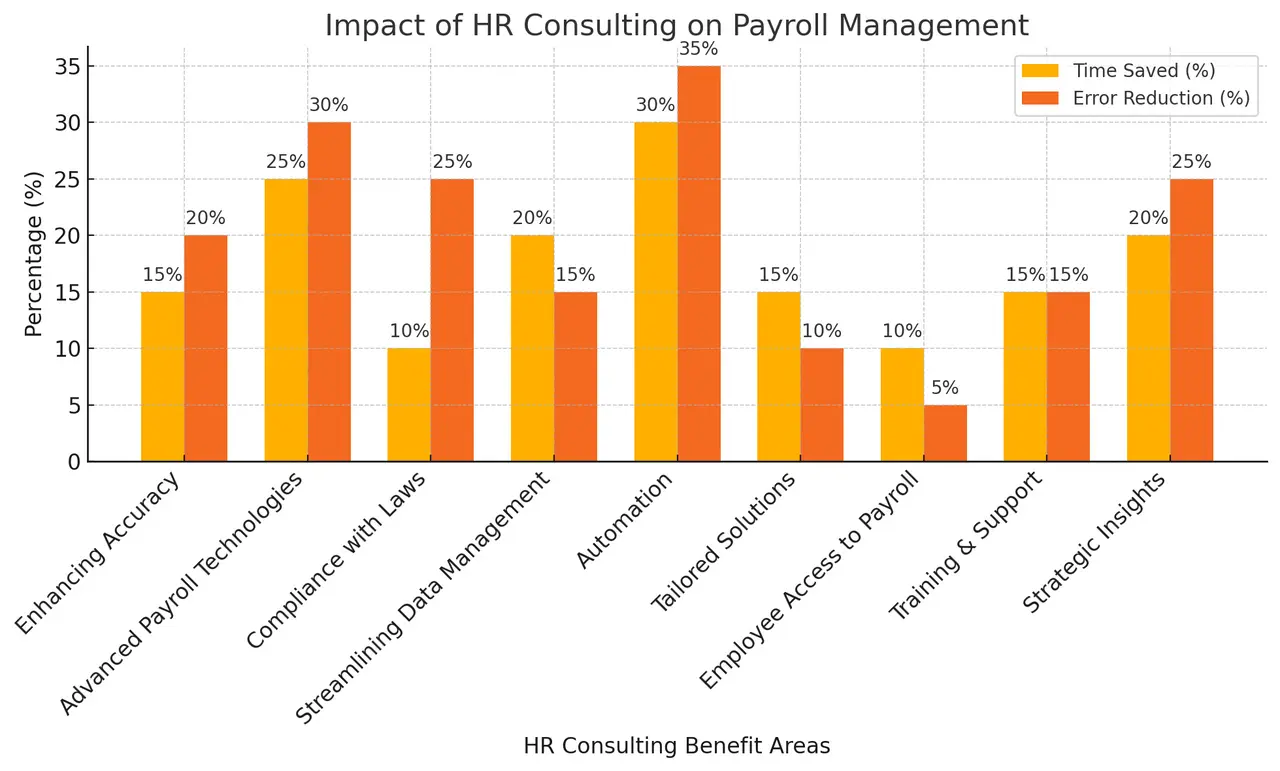Managing payroll can often be a daunting task for businesses, but with the right strategies, it can become a streamlined process. HR consulting services have gained popularity for providing expert solutions to simplify these complex tasks. In this blog, we will explore how HR consulting can effectively enhance payroll management, ensuring timely and accurate processing, while also allowing businesses to focus on their core objectives.
1. Enhancing Accuracy with Specialized Expertise
In the world of payroll management, accuracy is paramount. Errors can lead to serious complications, ranging from employee dissatisfaction to legal repercussions. This is where HR consulting provides a vital role. With teams of specialized experts, HR consultants bring a depth of knowledge that can dramatically reduce the margin of error. They’re up-to-date with the latest payroll regulations and industry standards, ensuring your business stays compliant while minimizing mistakes.
Additionally, the ability of HR consulting to assess and troubleshoot existing payroll systems is invaluable. Consultants can identify areas where inaccuracies commonly occur and implement checks and balances that enhance overall precision. This ensures that employee records are kept in pristine condition and every paycheck reflects accurate hours worked, deductions, and benefits—thus fostering trust between employers and their employees.
2. Implementing Advanced Payroll Technologies
The integration of technology into payroll systems can be transformative, and HR consulting firms are often at the forefront of this shift. By adopting advanced payroll technologies, businesses can automate routine tasks, enabling faster processing times and reducing the room for human error. This not only streamlines operational procedures but also empowers HR teams to focus on more strategic initiatives.
Another significant advantage of utilizing advanced payroll technologies is data security. Managed properly, cloud-based payroll solutions ensure that sensitive information is protected against breaches. HR consultants help businesses navigate through the various technological options available, selecting the best tools that align with organizational goals while ensuring robust security measures.
Moreover, these tech innovations contribute to better data analytics. With precise and real-time data collection, businesses can make informed decisions regarding workforce management, compensation strategies, and overall organizational efficiency. This means HR consulting doesn’t just streamline payroll; it contributes to broader business intelligence.
3. Ensuring Compliance with State and Federal Laws
Navigating the maze of state and federal laws governing payroll can be a daunting task. However, compliance is non-negotiable, as failing to adhere to regulations can lead to costly penalties and legal issues. This is where HR consulting shines, as the consultants possess a thorough understanding of applicable laws and regulations. By monitoring changes in legislation, they ensure that your payroll processes remain compliant.
Further, HR consultants can implement compliance training for internal staff. This educational aspect empowers your team to stay abreast of the necessary laws and best practices, creating a culture of vigilance within your organization. By embedding compliance into the fabric of your payroll practices, you safeguard your business and build a responsible operational ethos.
4. Streamlining Data Management and Reporting
Efficient data management is a cornerstone of effective payroll management. With HR consulting, businesses benefit from streamlined data collection and management practices. Consultants often recommend the best data management systems that reduce time spent on manual entries and ensure data integrity.
Furthermore, comprehensive reporting tools allow businesses to generate detailed analyses of their payroll processes. With HR consulting, you can create customized reports that provide valuable insights into spending patterns, employee compensation, and departmental performance. The clarity offered by these reports supports strategic decision-making across various levels of the organization.
5. Reducing Manual Work Through Automation
One of the most significant benefits of HR consulting is the reduction of manual work through automation. Payroll processing often involves repetitive tasks that can consume valuable time and resources. By utilizing HR consultants, companies can implement automated systems that handle these tasks seamlessly.
Automation not only speeds up payroll processing but also minimizes human error. Consequently, HR consulting leads to a more efficient use of resources, allowing team members to engage in more strategic functions rather than being bogged down in menial tasks. This elevates the overall productivity of the human resources department significantly.
6. Providing Tailored Solutions to Meet Unique Needs
No two businesses are alike, and HR consulting recognizes this diversity in payroll management needs. Consultants assess unique business requirements and craft tailored payroll solutions that meet these specific demands. Whether you operate in a niche industry or have complex compensation structures, a collaborative approach with HR consultants ensures that your payroll processes align with your unique organizational culture.
This level of customization means that as your business scales, your payroll solutions can evolve as well. HR consulting firms often provide ongoing support, adjusting strategies as needed to keep pace with changes in the workplace. This adaptability offers a significant advantage for businesses aiming for long-term sustainability.
7. Improving Employee Access to Payroll Information
In today’s fast-paced business environment, transparency is key. Employees desire immediate access to their payroll information so they can better manage their finances. HR consulting aids businesses in implementing systems that provide self-service portals for employees, enhancing their access to vital payroll data.
These user-friendly portals not only allow employees to view their paystubs and tax documents but also enable them to make changes to their personal information with ease. This creates a sense of empowerment among employees, as they feel more in control of their pay-related concerns, ultimately leading to improved morale and engagement.
8. Facilitating Training and Support for HR Teams
Effective payroll management relies heavily on the skills and knowledge of HR teams. HR consulting plays a fundamental role in providing tailored training and ongoing support for these teams. With industry-specific training programs, consultants can enhance the abilities of HR personnel, equipping them with the tools they need to navigate complex payroll situations confidently.
Furthermore, ongoing support from HR consultants fosters an environment of continuous improvement. Consultants provide resources and guidance as needed, ensuring that the HR team remains equipped to handle the evolving landscape of payroll management successfully. This level of training not only boosts confidence but also increases the overall effectiveness of the HR function.
9. Transforming Payroll Insights into Strategic Decisions
Payroll data is a treasure trove of insights that can drive strategic decisions across an organization. HR consulting helps businesses learn how to harness this data effectively. By analyzing payroll trends and metrics, consultants support organizations in understanding workforce costs, productivity levels, and budget allocation.
With these insights, businesses can make informed decisions regarding staffing, compensation adjustments, and even future growth strategies. This analytical perspective not only optimizes payroll processes but empowers leadership to align workforce management with broader business objectives, ensuring a cohesive approach to growth.







